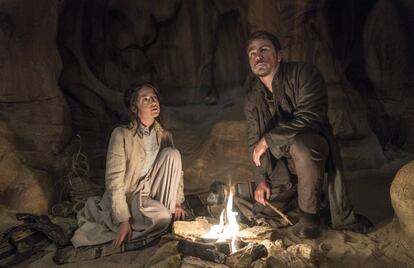Why foreign film companies love Spain
Aside from great locations, tax breaks are attracting the likes of ‘Game of Thrones’ and ‘Penny Dreadful’

Whooping their war cries, hundreds of bare-chested Dothraki riders gallop into battle across a desert plain. The scene, from the sixth series of HBO’s Game of Thrones, was shot in the Bardenas Reales nature reserve in Spain’s northeastern Spanish region of Navarra using locals as the fearsome mounted warriors.
Meanwhile, on the Canary island of Fuerteventura, a well-known time traveler awakes. After a long and difficult journey, he arrives on his native planet of Gallifrey. This is the fourth episode of the BBC’s Doctor Who that has been filmed in Spain in three years: swapping the broadcaster’s Cardiff studios for the Iberian Peninsula is becoming something of a habit.
Spain is once again becoming a favorite location for foreign television companies, enjoying a run akin to its 1960s heyday when Italian film director Sergio Leone built a mini Hollywood in the deserts of Almeria. The appeal is easy to explain, says Carlos Rosado, president of the Spain Film Commission (SFC): “After part of the fifth series of Game of Thrones was filmed in Seville, HBO wanted to come back, but on one condition: there had to be a tax incentive.” Rosado negotiated the corporate tax reforms with representatives of the Spanish government: “We were the only country without tax breaks.”
Rosado managed to change that, though the breaks are less generous than in France and Germany. Since 2015, big foreign production teams have enjoyed a 15% tax break on expenses compared to 30% in France and 40% in Germany.
Spain is once again a favorite location for foreign television companies, enjoying a run akin to its 1960s heyday when Sergio Leone built a mini Hollywood in the deserts of Almeria
But Spain makes up for the shortfall, says Rosado: “It’s cheaper, our people are well trained, we have a proud cultural heritage, the climate is better and it’s easy to get around. In the morning you’re in the snow on a mountain and in the afternoon you’re on a tropical beach. It’s a small country full of contrasts.”
This is how Doctor Who was freezing in the snowy Sierra Nevada of Granada one week and baking in the arid Spaghetti Western desert in Almeria the next. He didn’t need the tardis, the two locations are just a couple of hours apart. A year later, the Doctor was walking on the moon – in fact, he was on another Canary Island, Lanzarote, where the production team enjoyed a tax break of 30%.
Penny Dreadful is another series taking advantage of Spain’s new tax incentives. The third season was shot in Sergio Leone’s American west in Almeria, but the conditions have improved over the last half century. Besides the tax breaks, there are other developments that appeal. “Before, they had to bring their own team,” says Rosado. “But now there’s an industry here that’s qualified to help. We don’t just provide extras. We can contribute anything from electricians to actors.”

Rosado cites the experience of Fresco Films, the company that produced Game of Thrones and Emerald City, and filmmakers such as Paco Cabezas, who has directed four episodes of Penny Dreadful. “I had access to better resources than in a lot of films,” says Cabezas, who also shot the Nickelodeon comedy series, Lost in the West in the area. “After Almeria, I don’t know what’s left: we’ve had horses, shoot outs with vampires, snakes…”
But what does Spain get out of it? Rosado points out that apart from boosting its tourism brand, “there are also economic benefits. Around 40% of our budget is spent on services, local workers and hotels. In Exodus, they spent €800,000 on petrol. Another factor – it’s good for Spain’s reputation. If HBO are happy, that has a knock-on effect and the local industry grows.”
And HBO - and others – are happy because Spain appears to have it all; beaches, volcanoes, deserts and medieval cities. Game of Thrones conjures up the past with the historical walls and cobbled streets of Peñiscola and Girona and, while the remake of Oz, Emerald City was shot in the old quarters of Malaga, Seville and Granada, and the pilot episode of Still-Star-Crossed brought Romeo and Juliet’s Verona to life in Salamanca, Caceres and Plasencia.
Sign up for our newsletter
EL PAÍS English Edition is launching a weekly newsletter. Sign up today to receive a selection of our best stories in your inbox every Saturday morning. For full details about how to subscribe, click here.
But Spain has more to offer than fantasy locations. In the miniseries The Night Manager, Madrid and Mallorca provide the backdrop to the action between Spanish actor Antonio de la Torre and bad guy Hugh Laurie. What’s more, a number of the supporting actors have real Spanish accents: “There’s an extra tax incentive for using Spanish talent,” says Rosado.
While Rosado is positive about the future and keen to avoid the mistakes of the past, Cabezas says the Spanish government could provide more incentives to attract foreign television and film companies. “They’re not going to find another city like Almeria anywhere,” he says, “but they have to sort out the tax situation. This generates wealth. It’s worth hundreds of advertisements.”
English version by Heather Galloway.
Shoots across Spain
Game of Thrones
Emerald City
The Night Manager
Penny Dreadful
Doctor Who
Lost in the west
Still Star-Crossed
Benidorm
SunTrap

Girona (Catalonia), Peñíscola (Castellon, Community of Valencia), Natural Park of Bardenas Reales (Navarre), Castillo de Santa Florentina (Canet de Mar, Barcelona), Castillo de Zafra (Guadalajara), Alcazaba de Almería, Pechina, Tabernas, Carboneras (Almeria), Sevilla and Osuna.
El Torcal de Antequera (Malaga), Real Alcázar in Seville, Sierra Alhamilla and Cabo de Gata (Almeria), Guadix and Calahorra (Granada).
Majorca and Madrid.
Pechina y Tabernas (Almeria).
Almeria, Fuerteventura, Sierra Nevada (Granada), Tenerife and Lanzarote.
Almeria.
Salamanca, Caceres and Plasencia.
Benidorm (Alicante).
Gran Canaria.
Tu suscripción se está usando en otro dispositivo
¿Quieres añadir otro usuario a tu suscripción?
Si continúas leyendo en este dispositivo, no se podrá leer en el otro.
FlechaTu suscripción se está usando en otro dispositivo y solo puedes acceder a EL PAÍS desde un dispositivo a la vez.
Si quieres compartir tu cuenta, cambia tu suscripción a la modalidad Premium, así podrás añadir otro usuario. Cada uno accederá con su propia cuenta de email, lo que os permitirá personalizar vuestra experiencia en EL PAÍS.
¿Tienes una suscripción de empresa? Accede aquí para contratar más cuentas.
En el caso de no saber quién está usando tu cuenta, te recomendamos cambiar tu contraseña aquí.
Si decides continuar compartiendo tu cuenta, este mensaje se mostrará en tu dispositivo y en el de la otra persona que está usando tu cuenta de forma indefinida, afectando a tu experiencia de lectura. Puedes consultar aquí los términos y condiciones de la suscripción digital.









































